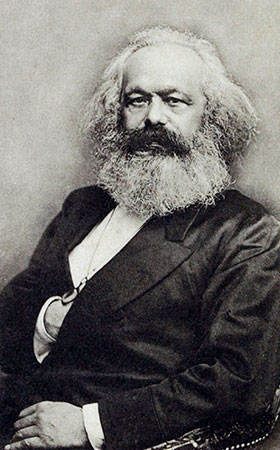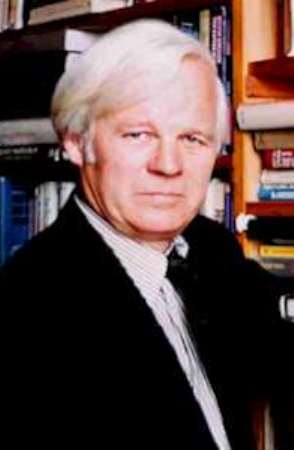This book is primarily a collection of essays by Daniel Friberg, who has long experience within the Right, despite his relative youth, and is presently CEO of Arktos Media Ltd., one of the premier publishers of ‘New Right’ and Traditionalist books, both from new authors and from those such as Julius Evola and Moeller van der Bruck.
Because Friberg has direct experiences both as a theoretician and as an activist, his advice and observations on a variety of levels are particularly valuable. Living in the backwater of New Zealand, which is to paraphrase T. S. Eliot, an intellectual ‘wasteland’, I find this volume useful and perceptive, so I dare say it should prove likewise for Right-activists in every country.
One does not even need to get beyond the cover to have one’s thinking processes activated. The adage, ‘one cannot tell a book by its cover’, is not quite correct in this instance. The cover art is a clever juxtaposition of a conservative looking white, middle aged male in a business suit with a fleur-de-lis lapel pin. In the background a city is engulfed in flames. The ‘conservative’ looks ahead, not behind, as the ‘old’ (that is, ‘modern’) world falls.
As what Marx disdainfully called a ‘reactionist’ in The Communist Manifesto, it has struck me how the ‘Right’ has often succumbed to both the symbols and the ideology of ‘The Enlightenment’. Thus the most significant elements of the French Right celebrate Bastille Day, parade with the Tricolour instead of the Fleur-de-lis, sing with gusto the Marseillaise; mourned the attack on Charlie Hebdo as an Islamist outrage against Western values, along with the Grand Orient de France, Communist Party, U.S. State Department, et al. The Fleur-de-lis extends back to the very beginning of ‘Europe’, as a tangible identity.1 It is therefore fitting that Friberg dedicated the book to the memory of Dominque Venner, a man of the ‘real Right’ in every sense, who fought and thought like few others, and ended his life at Notre Dame Cathedral in a final act of defiance against the country whose revolution was epochal in shaping the ‘modern world’.
I
Right: the True – and only – Opposition
Remaining at the cover, the subtitle is well-chosen: ‘A Handbook for the True Opposition’. Only the ‘Right’ stands against the ‘modern world’; the cycle of Western decay proceeding since the time of the Reformation. Spengler pointed out in The Decline of the West, Prussianism and Socialism, The Hour of Decision, and sundry essays,2 that Marxism and other forms of socialism did not seek to transcend capitalism but only to appropriate it for another class. He also pointed out that such types of socialism do not even result in the appropriation of capitalism by the proletariat, but serve the interests of money. Spengler meant that both metaphorically, insofar as Marx remained under the pervading impress of the English materialistic Zeitgeist; and literally, insofar as the Left has always been subsidized by big money. While many have written over the past century of this association, and the anarchist Mikhail Bakunin opined that Marx and Rothschild were of the same mould, recently Dr. Richard B. Spence of Idaho State University has definitively documented the funding of Russian Marxism.3 Spengler remarked that ‘people’s revolts’ have been used by covert interests since the days of Tiberius Gracchus. Revolts in the name of ‘freedom’ against tradition tend to bring the ‘freedom’ to plutocrats. One can see it in the Reformation of Henry VIII, The Puritan Revolution of Cromwell, the influence of Calvin et al, Jacobinism, the bourgeoisie revolutions of 1848, the Russian revolts, as mentioned, and the thoroughly bogus and banal ‘youth rebellion’ of the 1960s and 70s.

Oswald Spengler
The ‘New Right’ was the answer to the phoney revolt of the ‘New Left’, and has continued to be so. At the time, again in France a civil war threatened and New Left youth fought street battles against Ordre Nouveau youth. From such a milieu the New Right emerged. The New Left, including Gloria Steinem’s ‘feminism’, was never much more than a tool of the Establishment used to deconstruct an existing order for the benefit of a new one modelled on revolutionary principles.4 It is now openly acknowledged that a politicised intelligence community exploited disaffected Trotskyites and Mensheviks whose hatred of the USSR morphed into ‘neo-conservativism’, which is neither ‘new’ nor ‘conservative’.5 For example, the line of succession from the Congress for Cultural Freedom is continued by the National Endowment for Democracy,6 and a seemingly endless number of NGOs, think tanks and foundations. Subsequently, the post-New Left has been just as much an ideological weapon wielded by the governing oligarchy and U.S. foreign policy as its predecessor, and prior to that of Trotsky himself.7 This includes in particular the well-planned, funded and executed ‘spontaneous’ ‘colour revolutions’ engineered by USAID, NED, Soros’ Open Society Foundations, et al.8

Karl Marx
However, the Right has always been the ‘true opposition’. Wherever tradition has been destroyed or subverted in the name of ‘democracy’; ‘liberty, equality, fraternity’, or ‘down with the papacy’, ‘down with the Czar’, ‘fight apartheid’, self-absorbed and power focused interests disconnected from the historical communities they benefit from have arisen on the ruins of their civilisation. It was so in Gracchus’ day, during the street riots of the doped, hairy and stupid during the 60s, and is so today with the ‘colour revolutions’. It was so during the French Revolution, when the rights of group association (guilds) were given a final kick in the name of individual liberty, and were abolished in favour of the free market. It is not difficult to see what the various projects and initiatives under the auspice of multi-billionaire George Soros, for example, are funding and promoting: everything that undermines tradition in any targeted society, from ‘reproductive rights’ (euphemism for abortion), transnationalism (another euphemism for the erasure of the nation state) to the transgender agenda (perhaps the final assault against human nature). It was the Right, the ‘reactonists’, as Marx called them, who resisted free trade capitalism and the destruction of group association and normative morality, while Marx supported free trade due to its subversive character and his acolytes today have turned vice into virtue. This is all part of the historical dialectic.9
So, with the ‘true Right’ we have the only genuine ‘opposition’ to modernist decay, and its plutocratic sponsors, while the bogus opposition of the Left, like its predecessors, the Marxists and the 60s generation, march behind the slogans of ‘down with borders’, ‘one world, one race;’ i.e. precisely the slogans of the transnational corporations. This might be the reason why the Left gets such a good press, and why the Right is invariably pilloried by the globalist news media, and is being frenetically purged from social media, whose executives are at the forefront of fomenting revolt among befuddled youth,10 just like their mindless of forebears of the 60s and 70s.
II
New Right

Daniel Friberg
The book begins by descriptions of Friberg’s involvement with the Swedish Right, and the ideological shambles that it had become. The Right was at an ‘impasse,’ and it was largely thanks to Friberg who ‘cut this Gordian knot’ in introducing the New Right form France. I tend to think that the ‘New Right’ is actually a return to the traditional Old Right, prior to the Right being subverted, ironically, by its antithesis: liberalism. The Old Right (traditionalist) and the ‘New’ are both intrinsically anti-capitalist, anti-materialist, and offer instead of an obsession with individual rights, the rights of group association that were in vogue up to Jacobinism and a return to an organic state, which both Liberalism and Marxism decry. The Right has become confused with its opposite – Whiggery, Free Trade; it’s not Right, and it’s not even Tory. Oswald Spengler pointed out in Prussianism and Socialism (1920) and The Decline of the West (1918) that the Right is intrinsically anti-capitalist, while what is called ‘socialism’ is imbued with the zeitgeist of capitalist England, from whence it emerged.
Hence the necessity of the ‘real Right’ to ‘return’; to take the Right away from Whiggery. Indeed, Joakim Andersen, editor of Motpol, the New Right think tank founded by Friberg, cogently states in the Foreword that what is portrayed as the Right today is an ‘imposter’. He says that if contrasting the ‘true’ with the ‘false’ Right one finds ‘socialist’ tendencies within the ‘true’. While this will befuddle journalists, academics, and others of a politically retarded disposition, it should be stating the obvious to the ‘Right’. That this is met with antagonism or bewilderment by many who called themselves Right indicates the level to which the Right has been subverted. These libertarians are in the wrong place. Andersen refers to solidarity within organic groups as a basis for the true Right.11 Again we come to a return of the traditional, the pre-capitalist order, the return to an organic society that Marx despised a ‘reactionism’, because it threatened to derail his notion of the dialectics of history that required a capitalist phase before proceeding to socialism and communism.
III
Metapolitics

Antonio Francesco Gramsci.
As for Friberg’s collection of essays, they begin with a chapter called ‘The Return of the True Right’, starting with the subverting of what remained of normal society after World War II. Prominent in this subversion was the Frankfurt School, from whence modernist theories on gender, race and family emanated to become mainstream. Friberg notes the New Right’s commitment to the importance of metapolitics, owing its origins to the Italian Communist Gramsci, who departed from orthodox Marxism in stating that the revolution must first be made by subverting institutions and changing culture; changing the consciousness of the population.
The Left was greatly enabled by the post-1945 anti-fascist era where anything of the Right was deemed ‘Nazi’, and likely to lead to genocide. This metapolitical Left could not have achieved much however, without the sponsorship of the Establishment. The Frankfurt School was sent en masse from Germany to the USA with sponsorship from the Rockefeller Foundation, where it was ensconced at Columbia University and later permeated American academia, providing the ideological foundation of the New Left.12

Theodor Adorno (right) and Max Horkheimer of the Frankfurt School.
While Friberg does not proceed to detail this, he does mention that the New Left that emerged in the USA, with its individualism and hedonism and detachment from the authoritarian USSR, did serve Establishment interests. It can be added that one of the seminal projects, again with big funding, was the book The Authoritarian Personality (1950) a project of Theodor Adorno and other emigres of the Frankfurt School, purporting to be a psychological study which rated attitudes towards family, gender, parents, law, with an ‘F’ (‘Fascism’) scale, defining those with traditional, hitherto normal, values, as potentially ‘Fascist’ and in need of therapeutics. Shortly thereafter dissidents started being confined to mental institutions, one prominent example being General Edwin Walker, who had become a leader of the fight against de-segregating schools in the South; and Rightist dissidents continue to be called the ‘lunatic fringe’ for maintaining standards that were regarded as normal prior to the Adorno study. The ideological foundations were provided by Herbert Marcuse, whose seminal books were also funded with ‘Establishment’ money. As Friberg state, “the New Left does not threaten the ownership of property or financial power relations”,13 and the bogus Right is satisfied with this; it has become “part of the Left”, having acquiesced on all the essential issues.
This situation was not broken until the emergence of GRECE in France (which has continued to have a worldwide impact, including significantly on the thinking of Alexander Dugin in Russia) which the media dubbed ‘New Right’. However, even here there is confusion, particularly in the Anglosphere, where the media and academia have appropriated the term to describe economic-liberalism. Hence the privatisation of the economy is described as ‘right-swing economics’. Nonsense. It is the ANC that privatised the parastatals that had been constructed by the Rightist Afrikaner government.
IV
Clearing the Course

Dominique Venner
The Swedish New Right emerged to address the inadequacies of the contemporary Right-turned-Liberal, to take the offensive and develop an ideology and culture that is required to change popular perceptions at deeper levels that voting for parties on some banal issue. As Friberg states the public “only sees, for the most part, the superficial aspects”14 of parliamentary successes. What must be developed is an independent Rightist media and culture. Hence, the Swedish New Right, and hence Arktos Media Ltd. which has developed into a multimedia project of worldwide scope.
The exclusion of actual Rightist views from the mainstream discourse resulted in 2005 in a group of university students promoting New Right books such as Michael O’Meara’s New Culture, New Right and texts from New Right luminaries such as Dominique Venner and de Benoist. The following year, the think tank Motpol was formed and from there Arktos. This would be metapolitics from the Right, utilising the strategies of Gramsci, to break out of a political, ideological a cultural ghetto that was imposed not only by the Establishment and its Leftist stooges, but also the inadequacy of the compromised mainstream Right that had re-emerged, complex ridden, after World War II.
V
Handbook of Activism
The Real Right Returns is not however intended primarily as an ideological treatise, but as a handbook for practical activism, drawing on Friberg’s wide-ranging experiences. Given the global character of the counter-traditional offensive, Friberg’s advice is likewise of trans-national relevance. Explaining something of Gramsci’s background, Friberg states that “metapolitics, simply put, is about affecting and shaping people’s thoughts, worldviews, and the very concepts which they use to make sense of and define the world around them”. Political power comes after that shift in consciousness.15

Richard Lynn
The Establishment understood this need to metapolitically, culturally shift the popular consciousness, and did so Leftward, by the manipulation of the New Left and the sponsoring of Leftist extremism to the extent that the actual Leftist programmes sought by the Establishment seemed moderate, reasonable, and even ‘conservative’ by comparison. This was a dialectical strategy. The ‘Generation of ‘68’ is a symbol of the nihilism that their supposed Establishment enemies sponsored. It is significant that the latest manifestation of the New Right is called ‘Generation Identity’ to define itself as antithetical to the 68ers, even the most extreme and violent of whom can teach in academia,16 while someone such as Richard Lynn had his status as emeritus professor at the University of Ulster revoked by a vote of the student association in April 2018 for his alleged ‘racism’ and ‘sexism’. One might hope that some youth might start to wonder why the most violent of the extreme Left can maintain positions in academia, while those who have done nothing more than publish research that offends some Leftist sensibility, are pilloried by the mass media and driven from their professions. Should it not start to become apparent that maybe the self-styled ‘radicals’ are protected and promoted by the Establishment they profess to oppose, while ‘conservatives’ are driven to the fringes? Who then, as Friberg puts it, is ‘the true opposition’? The rational faculties of youth have become so atrophied by social media, academia, and mass entertainment that thinking that deeply becomes problematic; perhaps painful.
Hence, the primary mission of the European New Right is to be a “metapolitical vanguard”,17 and much of the volume examines this. “But mepatapolitcs does not simply undermine and deconstruct; it creates, encourages, inspires, and illuminates.” It puts “the Right in motion” with its own media.18
VI
Doctrine

Alain de benoist
The third chapter briefly examines some primary points of New Right ideology, referring to the individual having a broader identity as part of a community, which has been undermined by both liberalism and Leftism. Friberg identifies a “unified, independent Europe” as a primary cause of the Right.19 He alludes to a multipolar world, where geopolitical blocs are emerging that challenge the projected unipolar world of globalism, under U.S. auspices. Given the rise of ‘Euroscepticism’ in tandem with a ‘populism’ generally identified with the ‘Right’, the New Right’s commitment to a new Europe, and one which can enhance rather than obliterate local identities, while not restoring to petty-statism and fracture, is important. Friberg specifically mentions the need for the development of local and regional identities. He calls for Europe to align with superpowers that support European identity in the face of globalism, and that surely can only mean Russia.20
In the description on economics, often not well understood in Rightist circles, despite the primacy of the Right between the world wars as the movement of liberation from speculative capitalism, Friberg states that “we advocate the primacy of politics over economics”.21 This is something that the Right has usually failed to address since 1945, and the adoption of liberal economic policies is hardly the answer of the Right but an historic travesty.22 The Right forgot its origins and was derailed; the New Right returns to origins. Friberg points out that the subordination of economics to politics does not however mean the stifling of the individual entrepreneur, and Spengler emphasised the same ninety years ago.23 Friberg quotes de Benoist as saying “we’ll gladly welcome a society with a market, but not a market society”.24 This is the radical alternative that only the Right representatives, and only the Right ever has, since the days of Jacobinism, Cromwell, and one might say of the Reformation when oligarchy usurped the traditional order in the name of ‘freedom’.
VII
Practical Advice
Friberg has some very practical advice on dealing with the mass media. For what it’s worth it accords with my own experiences and conclusions of forty plus years. The internet has enabled the formation of independent media. Whereas the Right was hitherto limited to handing out flyers to perhaps a few hundred people, with the likelihood that not one recipient would be interested, now cyber-space enables prompt and economical outreach to tens of thousands. The Right once symbiotically needed the mass media of the ‘enemy’, for the enemy media to convey some distorted and meagre fraction of its message. The intermediary of the enemy media between the Right and the people it is wanting to reach is no longer required. Indeed, such was the reliance that flamboyant stunts, provocations and exaggerations to get publicity replaced, of necessity, the ideology of the Right, and it is not surprising that such recruitment methods attracted many downright ‘untermensch’ and ‘chandala’, to paraphrase Nietzsche. This was the time when the organiser of the British National Front said “we will kick our way into the headlines”. That they did, but to the detriment of sound and lasting foundations.

Friedrich Nietzsche
We no longer need the enemy media to convey our message. If we wish to use it at all, it can be on our terms. Friberg recommends that one can simply respond to the media with ‘no comment’, treat them with contempt, litigate (I have on occasion used the free services of media standards tribunals with success), boycott; do not go on the defensive, network to help others, such as with employment issues. On a related theme, Friberg offers advice on dealing with smear-mongering agencies that the Establishment media often utilises, such as the ‘Southern Poverty Law Center’, ‘Searchlight’, or the Swedish outfit ‘Expo’. Again, one is not obliged to deal with them, neither is there any need to be defensive and apologetic in the face of smears such as ‘racist’. Don’t get caught up in dialogue that will invariably be distorted and manipulated. No matter how reasonable or friendly such types seem, it is more likely to be a slimy front. As Friberg says, “their mental terrorism works only so long as we choose to participate in their games”.25
Chapter 6 comprises a convenient ‘metapoliticqal dictionary’, defining ‘Americanism,’ ‘anti-racism’, ‘bioculture’, ‘convergence of catastrophes’, ‘ethnocracy’, ‘hierarchy’, ‘organic humanism,’ ‘soft genocide’, ‘xenophilia’ and so forth, comprising sixty-two entries.

Julius Evola
Friberg’s concluding chapter calls on Rightists to overcome defeatism, rationalised in particular with the Evolian notion of ‘riding the tiger’, and to resist cynicism and pessimism as ends in themselves. This includes the tendency for “filling up the Internet with extreme, aggressive comments attacking movements and people who want to accomplish positive things, and furthermore have the energy to try”.26 Indeed, while the internet has given the hitherto marginalised Right the ability to make its actual views known throughout the world, it has also provided a platform for some very pathetic hangers-on who delight in trying to ridicule and abuse, usually anonymously, often on the basis of utmost banality. This includes what I have noticed as a paradox: some of the most intelligent of New Right internet portals opening their blogs to the stupid and the cowardly. Surely what is required here is very simply a stricter editorial line to ensure interesting discussion, rather than pandering to the notion of ‘free speech’ for those who have neither said nor done anything of value.
The concluding chapter, ‘The War Within’, is by Björn Herstad,27 a Swedish businessman and commentator, who challenges the reader to first improve himself, or ‘overcome’ oneself as Nietzsche might put it. He calls on the individual to make a start by changing himself mentally and physically. Family life is important in Herstad’s advice. His closing words are: “The war begins within you!” What is needed is thought and deed. One without the other ends invariably in disaster. It reminds me of a small local group of youths that have begun in Wellington, New Zealand, the Dominion Movement, where physical fitness, tramping and boxing, converge with postering and stickering New Right slogans, reading and writing.28 In New Zealand where the Right has been of woeful quality, this small, new group is a living example of how even here the Right is returning to its real values. Friberg’s book is a valuable contribution towards that.

Dr. Kerry Bolton
– K. R. Bolton has been an assistant editor and publisher as well as contributing writer to a number of international periodicals and peer reviewed journals. He has been widely published on a variety of subjects in the scholarly and broader media. His books have included: Artists of the Right (in two volumes); Revolution from Above; The Psychotic Left; and many others. He has recently introduced and annotated an English translation of sundry Spengler essays: Prussian Socialism and Other Essays.
Endnotes:
- “Ancient Symbol Fleur-di-lis, Its Meaning and History explained”, Ancient Pages (blog) (10 October 2016) <ancientpages.com> (accessed 21 June 2018).
- See generally: Oswald Spengler, Prussian Socialism and Other Essays K. R. Bolton (ed.) (Black House Publishing, 2018).
- Richard B. Spence, Wall Street and the Russian Revolutions 1905-1925 (Trine Day, 2017).
- K. R. Bolton, Revolution from Above (Arktos, 2011) pp. 144-200.
- Ibid., pp. 138-143.
- Ibid., pp. 218-221.
- See generally: R. H. Bruce-Lockhart, Memoirs of a British Agent (Putnam, 1934). Bruce-Lockhart illustrates how Trotsky was released from British naval internment in Nova Scotia, en route to Russia in 1917, on the intervention of Sir William Wiseman, head of British Intelligence in the USA, who left that position after the war to assume a partnership in the firm of Kuhn, Loeb & Co., New York.
- K. R. Bolton, Revolution from Above, op. cit., pp. 213-244.
- K. R. Bolton, “Marx contra Marx: A traditionalist Conservative Critique of the Communist Manifesto”, Anamnesis Journal (online) (2 March 2012) <anamnesisjournal.com> (accessed 17 June 2018).
- See generally: K. R. Bolton, Revolution from Above, op. cit., pp. 235-240. Movements.org was founded in 2008 by the CEOs of Howcast, Google Ideas, with sponsorship from MTV, Meetup, CBS News, Pepsi, Mobile, YouTube, Facebook, U.S. State Department, et. al., to utilise social media among the young to foment and organise ‘colour revolutions’. The organisation does not seem to be as forthcoming about its sponsorship and background as hitherto; See their ‘About Movements’ page (accessed 17 June 2018).
- Joakim Andersen, Forward, Daniel Friberg, The Real Right Returns (Arktos, 2015) p. xv.
- K. R. Bolton, Revolution from Above, op. cit., pp. 101-109.
- Daniel Friberg, The Real Right Returns, op. cit., p. 8.
- Ibid., p. 11.
- Ibid., p. 24.
- Example: Bernadine Dohrn, leader of the SDS, and the even more extreme Weather Underground, taught at Northwestern University 1991-2013. Given the seriousness of the charges against the Weather Underground as domestic terrorists, the consequences were mild, and were no obstacle to entering the mainstream.
- Daniel Friberg, The Real Right Returns, op. cit. p. 25.
- Ibid.
- Ibid., p. 29.
- K. R. Bolton, Russia’s Fight Against Globalisation (Black House Publishing, 2018).
- Daniel Friberg, op. cit. p. 30.
- See K. R. Bolton, The Banking Swindle (Black House, 2013). Here Rightist regimes, parties and programmes are examined in terms of financial policies. K. R. Bolton, Opposing the Money Lenders (Black House, 2016) for texts from great financial reformers such as Father Coughlin, A. N. Field, Greenshirts, et. al.
- See generally: Oswald Spengler, Prussian Socialism and Other Essays, op. cit.
- Daniel Friberg, op. cit. p. 31.
- Ibid., p. 49
- Ibid., p. 112.
- Björn Herstad, “Swedish Contra Perspectives” (blog) <bjornherstad.se> (accessed 21 June 2018).
- For more on the Dominion Movement, see their website <dominion-movement.com> (accessed 17 June 2018).






Leave a comment